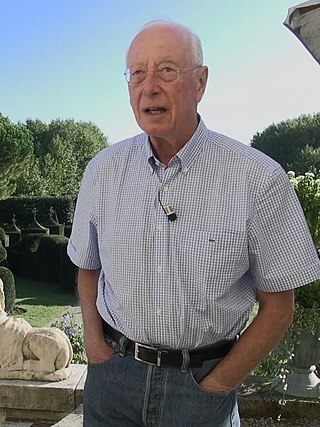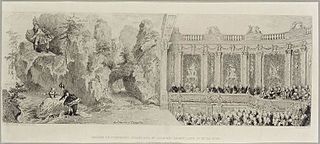
Actaeon, in Greek mythology, was the son of the priestly herdsman Aristaeus and Autonoe in Boeotia, and a famous Theban hero. Through his mother he was a member of the ruling House of Cadmus. Like Achilles, in a later generation, he was trained by the centaur Chiron.

Marc-Antoine Charpentier was a French Baroque composer during the reign of Louis XIV. One of his most famous works is the main theme from the prelude of his Te DeumH.146, Marche en rondeau. This theme is still used today as a fanfare during television broadcasts of the Eurovision Network and the European Broadcasting Union.

William Lincoln Christie is an American-born French conductor and harpsichordist. He is a specialist in baroque and classical repertoire and is the founder of the ensemble Les Arts Florissants.

Henri Desmarets was a French composer of the Baroque period primarily known for his stage works, although he also composed sacred music as well as secular cantatas, songs and instrumental works.

Stephen Stubbs is a lutenist and music director and has been a leading figure in the American early music scene for nearly thirty years.
Noémi Rime is a French soprano. She regularly appears in opera productions by William Christie's Les Arts Florissants ensemble. Her roles have included Cleone in Médée, Dido in Dido and Aeneas, and Fatime in Les Indes galantes. She currently teaches on the faculty of the Conservatoire à rayonnement régional de Poitiers.

Médée H.491 is a tragédie mise en musique in five acts and a prologue by Marc-Antoine Charpentier to a French libretto by Thomas Corneille. It was premiered at the Théâtre du Palais-Royal in Paris on December 4, 1693. Médée is the only opera Charpentier wrote for the Académie Royale de Musique. The opera was well reviewed by contemporary critics and commentators, including Sébastien de Brossard and Évrard Titon du Tillet, as well as Louis XIV whose brother attended several performances, as did his son; however, the opera only ran until March 15, 1694, although it was later revived at Lille.

Les Arts Florissants is a Baroque musical ensemble in residence at the Théâtre de Caen in Caen, France. The organization was founded by conductor William Christie in 1979. The ensemble derives its name from the 1685 opera Les Arts florissants by Marc-Antoine Charpentier. The organization consists of a chamber orchestra of period instruments and a small vocal ensemble. Current notable members include soprano Danielle de Niese and tenor Paul Agnew, who has served as assistant conductor since 2007. Jonathan Cohen is also on the conducting staff; Christie remains the organization's artistic director.

Acis et Galatée is an opera by Jean-Baptiste Lully. Unlike most of his operas, which are designated tragédies en musique, Lully called this work a pastorale-héroïque, because it was on a pastoral theme and had only three acts compared to the usual five. Otherwise, there is little musically or dramatically to distinguish it from Lully's tragédies.

Les arts florissants (H.487) is a short chamber opera in five scenes by Marc-Antoine Charpentier.
Air à boire is a French term which was used between the mid-17th and mid-18th centuries for a "drinking song". These were generally strophic, syllabic songs to light texts. Its predecessor was chanson pour boire, the difference being mainly that chansons pour boire were for one voice with lute accompaniment, whereas airs à boire are generally for more than one voice.
The Académie de Poésie et de Musique, later renamed the Académie du Palais, was the first Academy in France. It was founded in 1570 under the auspices of Charles IX of France by the poet Jean-Antoine de Baïf and the musician Joachim Thibault de Courville.

Didone abbandonata is an opera, or dramma per musica, by Giuseppe Sarti, set to a libretto by the renowned poet Metastasio. The opera was first performed in the winter of 1762 in Copenhagen, and was composed especially for the Danish court of the time. The opera consists of three acts, and the libretto is based upon the well-known story of Dido and Aeneas.
The Boston Early Music Festival (BEMF) is a non-profit organization founded in 1980 in Boston, Massachusetts, to promote historical music performance. It arranges an annual Boston and New York City concert series, produces opera recordings, and organizes a biennial week-long Festival and Exhibition in Boston.

David et Jonathas, H.490, is an opera in five acts and a prologue by the French composer Marc-Antoine Charpentier, first performed at the Collège Louis-le-Grand, Paris, on 28 February 1688. The libretto, by Father François Bretonneau, is based on the Old Testament story of the friendship between David and Jonathan.

La descente d'Orphée aux enfers H.488 is an incomplete chamber opera in two acts by the French composer Marc-Antoine Charpentier. It was probably composed in early 1686 and performed either in the apartments of the Dauphin that spring or at Fontainebleau in the autumn. Charpentier himself sang the title role, joined by musicians of Mademoiselle de Guise and members of the Dauphin's little ensemble; it was Charpentier's last appearance with this ensemble.

Les plaisirs de Versailles H.480 is a short opera by the French composer Marc-Antoine Charpentier. It was intended for performance at the new courtly entertainment known as les appartements du roi devised by King Louis XIV and held in his own apartments at the palace of Versailles in 1682. At the time, Charpentier was composer for Louis, le Grand Dauphin, the king's son. The librettist is unknown.
Agnès Mellon is a French soprano who specializes in baroque music.
Catherine Cessac is a French musicologist and music publisher.

Louis-Barthélémy Pradher was a French composer, pianist and music educator.














